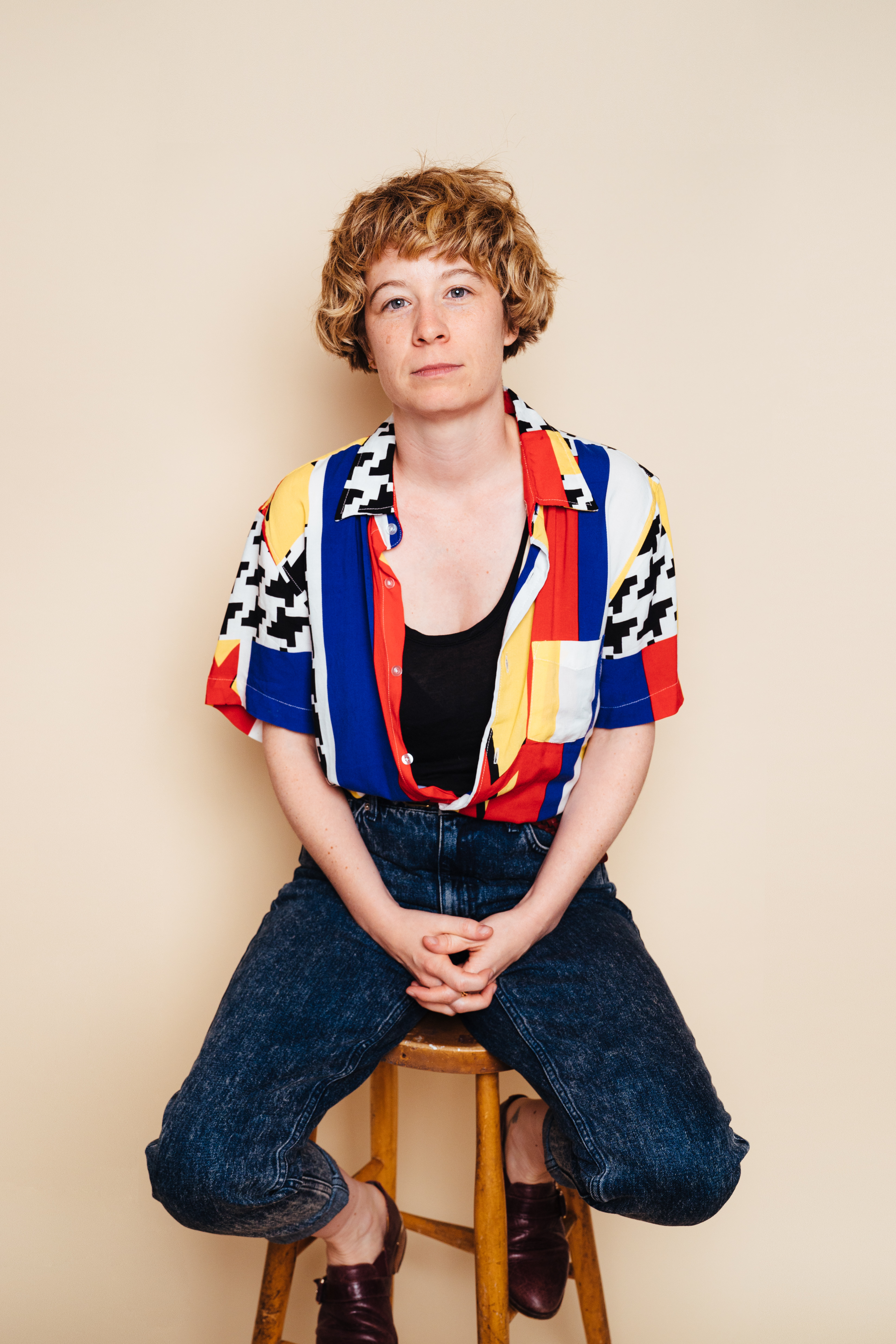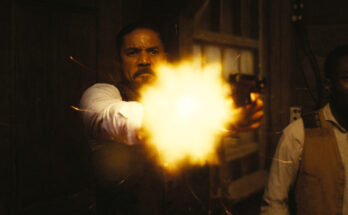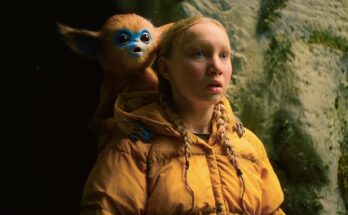Want to hear more from the actors and creators of your favorite shows and films? Subscribe to The Cinema Spot on YouTube for all of our upcoming interviews!
Managing editor & film and television critic with a Bachelor's of Arts in English Literature with a Writing Minor from the University of Guam. Currently in graduate school completing a Master's in English Literature.
My interview with the writer/director, Stacey Gregg took place on Tuesday, March 16th at 10:40 am Pacific Time. Her short film, Here Before, premiered at the South by Southwest (SXSW) film festival the following day. This article presented here is a polished transcript of our conversation.
Warning: Some minor spoilers ahead for those unfamiliar with the story and/or who have not yet seen the film!

Introductions
John Tangalin: Hi, my name is John Daniel Tangalin, and I am a film and television critic at The Cinema Spot. I’m here with Stacey Gregg, and she is the director of Here Before. Before we get into [our] discussion, Ms. Gregg, what is your film about?
Stacey Gregg: Well, it is about a family who lives in a suburb in Northern Ireland, and a new family move[s] in next door. [T]he new family have a little girl called Megan [played by Niamh Dornan], and Laura [played by Andrea Riseborough], who already lives there with her family, she becomes quite interested in this little girl and they strike up a friendship. As the film progresses, there are certain tensions between the two households that start to escalate. And I guess we understand there’s a lot more going on here. And Laura starts to become quite intensely interested in this little girl to the extent that her own family starts to fall apart.
Megan
JT: I do see that tension and I don’t want to give a lot away, but there’s something about Laura and her household that they’re kind of missing … in their life. [A]s we progress through this story, there’s something going on psychologically for her. How can we describe Megan?
SG: I think that Megan is a really interesting, charismatic, and precautious little girl. She has moved into this new area. I think you’re right. [S]he senses, as kids often do, that there are certain energies flying around between these two families and particularly from Laura. Laura wants something, and I think that Megan feels like she can give it for better or for worse. Megan, to be perfectly honest, reminds me of certain elements of myself when I was that age in that you don’t really understand the adult world and you don’t really understand the consequences of that kind of, what might seem to her as, play. [T]here is an innocence, absolutely, to Megan, but she [also] has quite a mischievous energy.
JT: I agree with you. When it comes to children, we have, let’s say, a curiosity about the world around us. And there [are] certain things that Megan says that — even with Laura, I can relate to … as an adult — when Megan sa[ys] certain things to her, and then Laura relays this [information to Megan’s] parents, they’re kind of confused. They don’t really think that Megan is saying the truth, or maybe she’s just joking around.
Megan’s Parents
JT, con’t.: What would you say about Megan’s parents?
SG: I think that the film very much treats Megan like a normal kid, and I think her parents [Marie and Chris, played by Eileen O’Higgins and Martin McCann, respectively] do as well. And within the realms of what Megan’s capable of, they know that she likes to chat, they know that she’s got an imagination. They know she’s a little maybe savvy at times beyond her years, but she’s still just a kid. And I think both her family, her mom and her mom’s partner/ boyfriend, and most of the adults around her just see that. But I think that because we’re with Laura so closely in the film, we can also see the version of events that Laura is experiencing, where Megan doesn’t seem to be behaving quite as we would expect.
Megan’s Impact on the Narrative
JT: Yeah. I had gotten confused, for lack of a better word where, in the second act, we see certain things happening to Laura. I think Megan impacts her. She leaves some influence or impact to the point where I’m wondering if maybe Megan could be an apparition. But then [perhaps] I’m also wrong because she’s very much real to this family that just moved in. I also see that there’s something going on with Laura’s son [Tadhg, played by Lewis McAdjue], and it’s not so much impacting Laura’s husband [Brendan, played by Jonjo O’Neill]. So what is going through Laura’s son’s head? I feel like he has depression, but that might be reaching too far. What can we say about him?
SG: I think that Tag is the product of a family that ha[s] managed to stay together and survive, despite having experienced a great loss. He is both he’s on the cusp of adulthood, but he’s also his mother’s son and he’s a little boy and he can read her. I think that Tadhg, at all times, is actually very clear-sighted, and he can feel what’s going on, but he doesn’t have the tools to deal with it. So we see that frustration play out because essentially he is still a kid and so limited in being able to deal with it.
Working On Camera
JT: You have a lot of great cinematography. I commend you and your crew for putting together a really well-shot film. What was the toughest part about filming this project?
SG: Practically speaking, it was quite a short shoot, and we were battling against very few daylight hours because it was shot in the winter in Northern Ireland. And we also had restrictions on the hours because of Child Hours. So there were a number of factors in terms of practically shooting. But also, as you sort of touched on earlier, there was a real subtlety and a line to be [had] between how performances are delivered and what we know — or [what]we think we know — as an audience. And so ensuring that we were capturing that at all times and sort of tracking that through the shoot, which is often non-chronological, and especially with working with young actors, th[is] took quite a lot of effort.
Hope for a Hopeful Ending
JT: There [are] some hints of what the ending could be like for these characters. Do you think that things will get better for Laura and her family?
SG: In some ways, I can’t answer that, but I do think that the film looks at the themes of, for example, grief and love, through a mature lens. And by that, I mean, I think that there’s no obvious bad guy or good guy. These are adults who are dealing with very difficult things and sometimes making very bad decisions. But they are trying to move forward. I think that love and stoicism are big parts of this. And yes, I would feel hopeful that this is a group of people who will try and forge forwards in some way, especially because there are kids involved.
Brendan’s Trauma
JT: Thank you. With [Laura’s] husband, I feel like he’s ignoring — or it doesn’t look like he wants to be a part of — this [conflict]. Of course, Tadhg is going through something, and Laura is going through something. But there’s not much concern with her husband other than the fact that she might be seeing things or she might be hearing or experiencing things. I feel like he’s in his own little world. Do you think that he’s maybe coping or … dealing with matters in his own way?
SG: I think that we are with Laura for a lot of the film, so we don’t entirely know what is going on with him. But I think that he desperately wants to keep things together and support Laura. But of course, without giving too much away, there’s a paradox in there. I think that he’s a man who is entirely trapped by that and doesn’t know what to do. So, yes, I think you’re right. He probably isn’t dealing with things, certainly not the way that we would expect him to.
Themes and Concepts
JT: I think there’s a lot of figurative masks throughout this film. I feel like everyone is hiding something that they went through or are going through. And the same thing [can be said] with Megan and her family. [W]hat are some themes that are covered … you mentioned love and grief. Are there other concepts that we can look forward to with [Here Before]?
SG: Yeah. I mean, I think the film is there for people to take from what they will. In that way, a good piece of work or art is like a Rorschach blot. It depends on the experience of the viewer who comes to it. Some people will track a certain version of the story or something that feels very resonant. I talked a lot in the design of the film about the presence of absence and about how multiple readings of events or realities can co-exist, and who are we to tell people that that is not the case. I guess I hope some of those things come through for an audience, but I think I’m less interested in work that tells people what it’s about or tells people what to think. [T]he film, without being unsatisfying, seeks to create a space where different interpretations can exist.
The Biggest Lesson
JT: I really liked that you brought up Rorschach inkblots and how there [are] different ways of interpreting the picture. [I]t’s very representative or … symbolic of what these two families are going through, like … a duality of sorts, or maybe there’s an ambiguous interpretation. It’s never just one way of looking at things rather than… It’s more like that you’re looking at this picture, so to speak, through different lenses. I just want to ask one last thing. You did mention that we can take a lot from this film. What is the biggest lesson that you’ve learned throughout the production of this project?
SG: What lesson have I learned personally and experienced in the making of the film?
JT: Yes. Personally and — you did mention — from the film’s standpoint that … there [are] many different ways at looking at this specific picture [or] the wider scope of the narrative or the story. What drove you to tell this story, and personally, what can you take from it that we [the audience] can also learn?
Exploring Trauma
SG: I think that I was interested in exploring and meditating on how and where grief and love and strength interact. And I know from life itself that that is not a clear-cut thing. So I wanted to make a film that, in some ways, recreated the experience of that. An audience might truly empathize as much as possible with Laura’s journey, and that’s quite tough. It’s not all films, I think, [that] have an interest in doing that. I think it can sometimes feel safer to be much more explicit about things, and I understand that. I absolutely appreciate those kinds of films.
But I feel that there’s a certain truthfulness to messiness and to a sort of density and from the script to the shoot, to the edit, preserving that, but also constantly interrogating it was a real experience and a real learning curve as well. I guess I come out [of] the other end of this film and I know you can do it. But it’s not straightforward [and] I think there’s a richness to it. And if it finds its audience, then I’m very happy.
JT: Thank you for telling me that. Yeah, there’s not a lot of spoken dialogue that pop[s] out. It’s more about how it’s said, and it’s what we see rather than what is heard. Thank you. Thank you for having this discussion, or [rather,] allowing me to jump into [the] discussion on this film. I really loved it. It’s really thought-provoking, and I feel like audiences at [the SXSW] film festival are going to love [Here Before].
I started to feel cranky and tired at this point in the interview. It was around 5:00 am in my timezone, and I seldom got much sleep beforehand. I told Gregg and her publicist that I had more to ask. Although, I also told them that I would email them my other questions later.
Bonus Questions
Here are the other questions that I asked:
The Meaning Behind the Film’s Title
JT: How can we interpret the film’s title? Is it due to the fact that we’re experiencing certain events again, or through some form of retrospection or traumatic memory recall?
SG: I happily leave that up to the viewer. But as evidenced by your instincts, there are a number of ways the title can be interpreted, much like the film. It may feel like we/ Laura have been here before, but everything is not as it seems.
What Grief and Coping Could Teach Us
JT: Earlier, Stacey and I discussed how flawed humans can be, especially in the grieving process. Are there any further means of coping that we — as an audience — can be taught in this film?
SG: I’m not sure the film is instructive per se, but I do think there is something in preserving an openness, and compassion even to people who behave badly through pain or fear; often even then, behind that behaviour is some form of love. There’s no simplistic bad guy or easy answers. There’s keeping going, and there’s allowing the world to comfort us, even if it isn’t the resolution we want.
JT: There is a line in the latter half of the movie that Laura says in regards to emotions felt toward another person. By the end of the film, she repeats herself. Although, there are some words that are omitted. Can this suggest a world of possibilities?
SG: Absolutely. Laura is navigating her way through a philosophical question as much as anything else. Nick Cave has written that ghosts are ideas, that we should listen to them. I think Laura goes on her own journey and comes to conclusions that preserve such possibility for her, in order to move forward.
Children Versus Adults
JT: Megan is one of the rather stranger characters in the film, I would suppose. At a certain point, she does begin to discover some things about Laura and her family. Would you say there are characters more observant or knowing than others, or is it that perception is key to a much wider understanding?
SG: I think kids pick up on energies all the time. I think anyone without all the facts can string together half-felt ideas to get a different picture. Megan picks up on something, though she mightn’t know what that is. But kids play on adult tensions, it’s part of growing up. And then, of course, she’s also a lonely, imaginative kid in a new area, and genuinely is drawn to Laura, genuinely wanting to please her.
Stacey Gregg’s Here Before is a tragic drama about loss and about how different people deal with their grief.
For more drama, mystery, and thriller-related news and reviews, follow The Cinema Spot on Twitter (@TheCinemaSpot) and Instagram (@thecinemaspot_). Also, please give us a follow on Facebook (TheCinemaSpotFB)!
Also, take a look at our review of Gregg’s film!
Managing editor & film and television critic with a Bachelor's of Arts in English Literature with a Writing Minor from the University of Guam. Currently in graduate school completing a Master's in English Literature.





